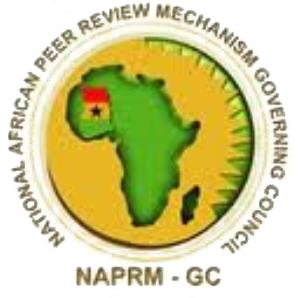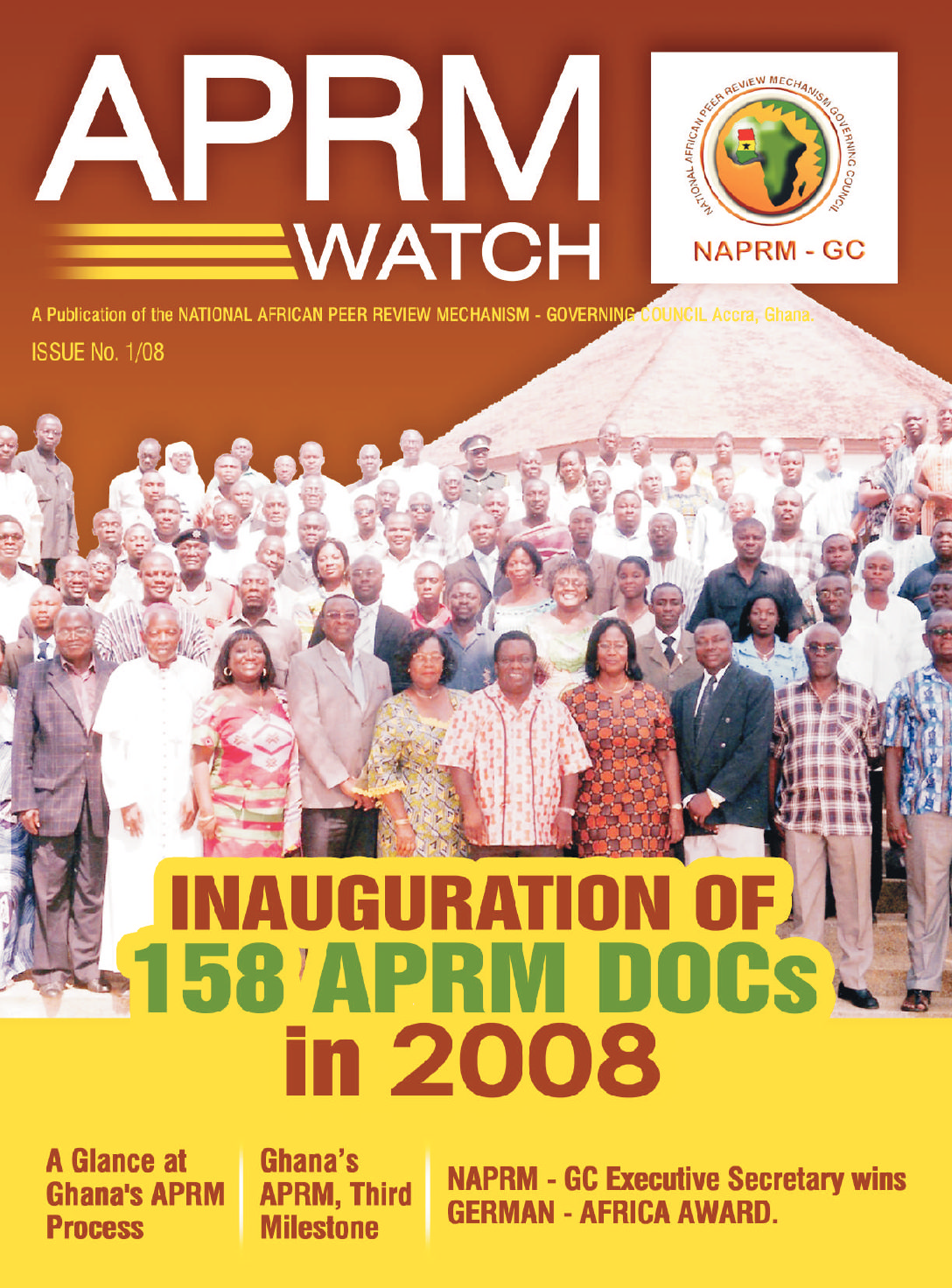
Professor S.K.B. Asante, Member of NAPRM-Governing Council
The idea of establishing a sub-regional knowledge-based organization for the promotion of good governance and democracy within the framework of the African Peer Review Mechanism (APRM) is not a product of recent manufacture. Its roots go further than are usually appreciated and are closely associated with Ghana’s implementation of the APRM process. Ghana, which is among the first six group of African states to accede to the APRM groundbreaking initiative, has shown demonstrable political commitment, will and resolve to the APR process since the inauguration of the National African Peer Review Mechanism Governing Council (NAPRM-GC) in March 2004.
By 2006, Ghana had become Africa’s APRM trailblazer, the pioneer, indeed the lead guinea pig in Africa’s latest governance experiment, the APRM. The review of Ghana at the 4th summit of the APR Forum at Khartoum, Sudan, on January 22, 2006, was historic and momentous in the history of African development country was subjected to a peer review. It was Africa’s finest hour. More significantly, in the implementation of the APRM National Programme of Action (NPOA), Ghana pioneered the idea of mapping the NPOA unto national development plans in order to provide the much-needed budget coverage. It also pioneered the idea of decentralizing the APRM implementation process through the inauguration of District Oversight Committees in all the 170 Administrative Districts of Ghana to educate and sensitize community members to better understand and own the APRM process.
Furthermore, and perhaps more importantly, Ghana, as a pan-African conscious country, began to share her APRM experiences with other African countries such as Kenya, South Africa, Namibia, Tanzania and Rwanda, but more actively with the neighboring participating ECOWAS countries, in particular with the Republic of Benin. This led the Ghana NAPRM Governing Council to initiate the idea of institutionalizing the collaboration with Benin and other participating countries within the West African sub-region through the establishment of a sub-regional knowledge -based organization for promotion of good governance and democracy within the framework of the APRM.
Highly conscious of African ownership of the APRM process, the late Dr. Francis Appiah, Executive Secretary of the NAPRM -GC Secretariat, sought to establish contact with Professor Alain Grandbois of the University of Quebec at Montreal (UQAM) and Elmar Frank of the Hanns Seidel Foundation for North America’s institutional and financial support towards the institutionalization of the NAPRM-GC’s idea of a sub- regional organization to accelerate the APRM process in West Africa. The contacts happily yielded the desirable fruits. It led to Professor Grandbois’s three-week mission to Ghana and subsequently, Benin, in March 2008, to familiarize himself particularly with Ghana’s experience in the implementation of the APRM process.
In June 2008, a conference on the APRM was held at UQAM attended by Ghana, Benin, Mali, Burkina Faso and such Canadian development partners as the International Development Research Centre (IDRC), Canadian International Development Agency (CIDA) and Partnership Africa and Canada (PAC) to deliberate on the subject of Ghana’s sub-regional knowledge- based organization project. In March and April 2009, Professor Grandbois made his second mission to Ghana to collaborate with the NAPRM-GC and the Commission of Benin on the preparation of the project on the establishment of an APRM sub-regional organization. A roundtable conference was held, in Accra, in April 2009, with APRM representatives from Ghana, Benin, Togo and representatives from CIDA and German Cooperation based in Ghana on the creation of a sub- regional organization for effective implementation of the APRM, as originally initiated by Ghana and strongly supported by the Republic of Benin. It was at this roundtable conference which, at the suggestion of the late Dr Francis Appiah, renamed the project as the West African Centre for the Advancement of the APRM (WACAA).
The main goal of WACAA, as a sub-regional knowledge- based organization, is to promote good governance and democracy as a major thematic area of the APRM process. Its general objective is to promote and enhance the APRM implementation process in the West African countries through the management of a shared regional knowledge-based organization. Its specific objectives
include:
Establishment and management of a shared regional knowledge-based organization that will coordinate the production, dissemination and sharing of knowledge and information on the APRM in the West African sub-region;
Promotion of civil society participation, popular ownership and bottom-up development strategy through civic education;
Promotion, sensitization, awareness creation and public education, using communication and information strategies, including the media;
Decentralization of the APRM implementation process to enable it to engage civil society participants at the district and rural levels to foster ownership
and decentralized management;
Mobilization of national and international expertise to undertake joint participatory action-research as an overall strategy on the APRM to enhance national capacities and to interrogate and create new knowledge to improve efficiency and effectiveness in the implementation of the APRM;
Sharing lessons learned and best practices to increase collaboration and networking, as well as strengthening capacities among the APRM participating countries in the West African sub-region; and fostering standards policies and programs that promote intra-country and inter-country dialogue through the APRM to promote regional cooperation and integration.
The uniqueness of a shared regional knowledge-based organization such as WACAA may be distinguished. First, the project brings together experiences of countries, such as Ghana, that are pioneers and are in their post-assessment phase, and countries such as Togo or Senegal that are in the process of initiating their implementation process. Capturing the different levels of implementation among the different countries would have the potential for effective monitoring and evaluation of the process at the grassroots level. Second, WACAA brings together the Anglophone and Francophone (and possibly the Lusophone) countries, which in itself make West Africa unique from the rest of the African continent. This approach would seek to explore the extent to which the APRM is promoting novel ways of collaboration among civil society groups across national and linguistic boundaries, which hitherto had been seen as barriers to cooperation.
And third, the WACC project seeks to promote sharing of experiences and practices in the West African sub-region. The programme design recognizes that creating a shared knowledge-based organization offers opportunities which otherwise would be lost if countries were to implement the APRM individually. This provides innovative approaches for improvement of APRM implementation, as they add value to the research that could enhance its potential as an instrument for promoting good governance in Africa.
Besides, an added value to be derived from the creation of a WACAA regional platform for the implementation of the APRM may include the following:
The regional approach has the potential for being cost effective to generate and disseminate knowledge and information about the APRM, as it eliminates the re-invention of the wheel as templates and blueprints on best practices and standards operating procedures which would be documented and made available to countries that accede to the APRM process;
WACAA would have the potential for managing constraints and problems of capacity, as a partnership among the APRM participating countries would compensate for shortfalls of a partner country. There is also the additional potential for mobilizing expertise across countries and making this available to all partners. The much-needed ownership for sustainable development would be also enhanced. The WACAA regional approach would facilitate the building of common and shared standard, benchmarks and policies. This aspect of the project would enhance promotion of good governance, as it provides criteria for best practices and ultimately foster transparency, credibility and integrity of the process;
Above all, the WACAA project has the potential for enhancing the promotion of the ECOWAS integration process in such areas as:
Adherence to the APRM thematic area of good governance and democracy by the ECOWAS member states would provide the essential bedrock for regional cooperation and sustainable development; Breaking down of linguistic barriers which have hitherto tended to impede the West African integration process;
The active participation of civil society, non-gov- ernmental organizations (NGOs), private sector and grassroots in the APRM process would considerably enhance the ECOWAS partnership with civil society organizations, which not only play an important role in the promotion of the aims and objectives of the Community programs; it would also contribute to the realization of the recently adopted vision of “ECOWAS of the People”.
Attempt has been made in this paper to highlight the essential background to the WACAA idea, as conceived by the Ghana NAPRM-GC, institutionalization of Ghana’s collaboration with Benin and other ECOWAS participating countries, the goals and objectives of WACAA, its uniqueness and added value. The project is based on a wide range of consultations, desk studies, preparation of conceptual documents, exchange of views and ideas in different fora among a number of stakeholders, including civil society, public and private sector executives. What is required now is a critical examination of the WACAA structures, management, funding and its relations with such important organizations as the ECOWAS, African Union (AU) within the framework of the African Governance Architecture, Economic Commission for Africa (ECA), African Development Bank (ADB), the United Nations Development Programme (UNDP), and development partners.

 newsletter-compressed
newsletter-compressed